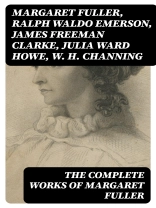This comprehensive anthology, *The Complete Works of Margaret Fuller, * gathers a rich tapestry of writings from one of the most influential intellectuals of the 19th century. Through a diverse collection of essays, poetry, and critiques, this volume encapsulates Fuller’s innovative spirit and her foundational role in the American Transcendentalist movement. Against a backdrop of societal reform and burgeoning American literary identity, these works challenge and expand notions of gender, individuality, and intellectual freedom, with standout pieces offering profound explorations of personal and societal transformation. The anthology is curated with contributions from notable contemporaries including Ralph Waldo Emerson, James Freeman Clarke, Julia Ward Howe, and W. H. Channing. These distinguished figures collectively represent a vibrant cross-section of Transcendentalist and reformist thought during the 19th century. Together, they highlight Fuller’s work within broader cultural and historical dynamics, drawing connections to movements advocating for spiritual growth, social reform, and women’s rights. Each voice in the compilation adds a unique dimension to Fuller’s legacy and further cements her role as a pioneering thinker of her time. Readers encountering this anthology are afforded a rare journey into a dynamic intellectual landscape. *The Complete Works of Margaret Fuller* is an invaluable resource for those keen to explore the intricate weave of enlightenment and reform that defines the era. This meticulously compiled volume not only offers a comprehensive understanding of Fuller’s vision but also invites readers to engage with the dialogs posed by her contemporaries. It is an essential collection for those seeking to comprehend the complexities of early American thought and its enduring influence on modern literary and cultural discourse.
Despre autor
Margaret Fuller (1810-1850) was a pioneering American journalist, editor, critic, translator, and women’s rights advocate. Born Sarah Margaret Fuller in Cambridgeport, Massachusetts, she became a key figure in the transcendentalist movement and one of the most influential literary personalities of her time. Fuller’s education was rich and extensive, a rarity for women in the early 19th century, and was largely influenced by her father, who provided her with a rigorous curriculum that helped shape her intellectual capabilities and feminist perspectives. As the first editor of the transcendentalist journal ‘The Dial’, Fuller became a crucial voice for social change, grounding her advocacy in both scholarship and activism. Her seminal work, ‘Woman in the Nineteenth Century’, is considered one of the earliest major feminist treatises, in which she argues for the independence and equality of women, building upon her calls for reform and self-assertion as documented in her reports in ‘The New York Tribune’. Her literary style is marked by a blend of penetrating critique, passionate idealism, and a firm belief in the potential for personal and collective transcendence. The ‘Complete Works of Margaret Fuller’ embraces her wide-ranging contributions to literature including her extensive correspondence, writings on Italian politics, and her intimate reflections before her untimely death in a shipwreck. As an advocate, writer, and philosopher, Fuller’s influence persists, formulating a critical foundation for subsequent generations of feminists and continuing to inspire those who encounter her powerful vision of social and personal transformation.












